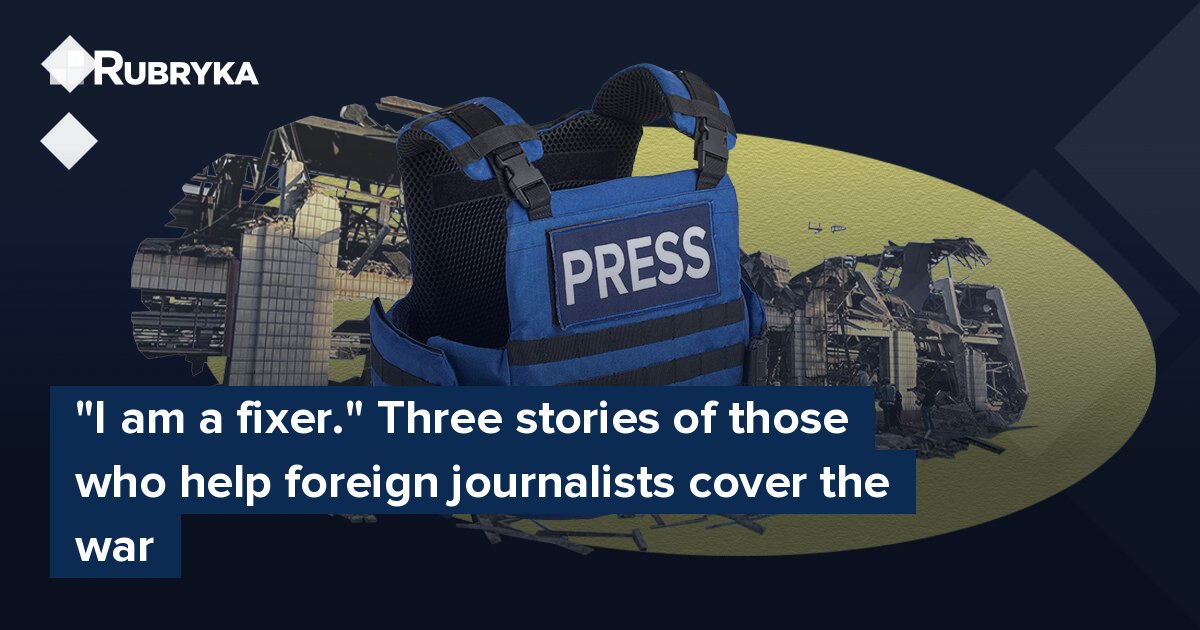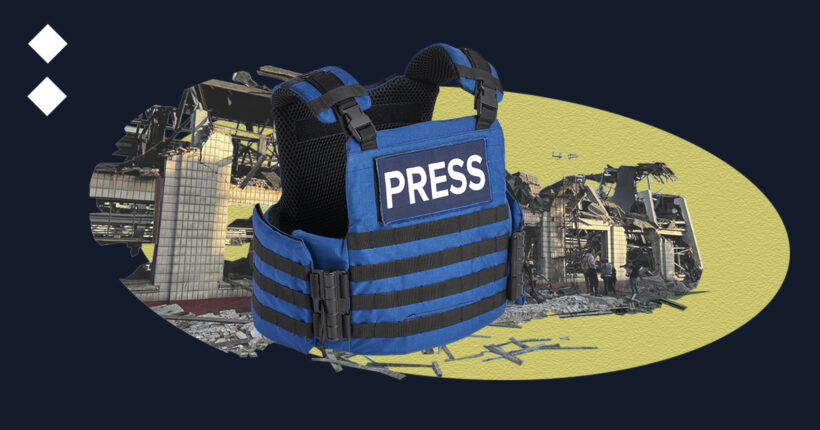
What is the problem?
With the beginning of Russia's invasion of Ukraine in February 2022, the media's interest in the events on Ukrainian territory increased tenfold. However, most journalists need assistance to navigate the Ukrainian context, language, and find their way around to find, coordinate and conduct interviews.
What is the solution?
Ukrainian fixers came to the aid foreign correspondents — these are Ukrainian journalists or representatives of other professions with knowledge of foreign langauges.
A fixer is a locally hired coordinator who helps solve problems and perform tasks to assist journalists, photographers, and television crews during their overseas deployments.
Rubryka spoke to several fixers from different cities in Ukraine and asked them about their vision of this emerging role.
How does it work?
Odesa resident Artem Perfilov: "Journalists will always be able to get along"
Before the full-scale invasion, Odesa resident Artem Perfilov worked in journalism. When the war started, he thought about becoming a fixer, but at first, didn't know how.
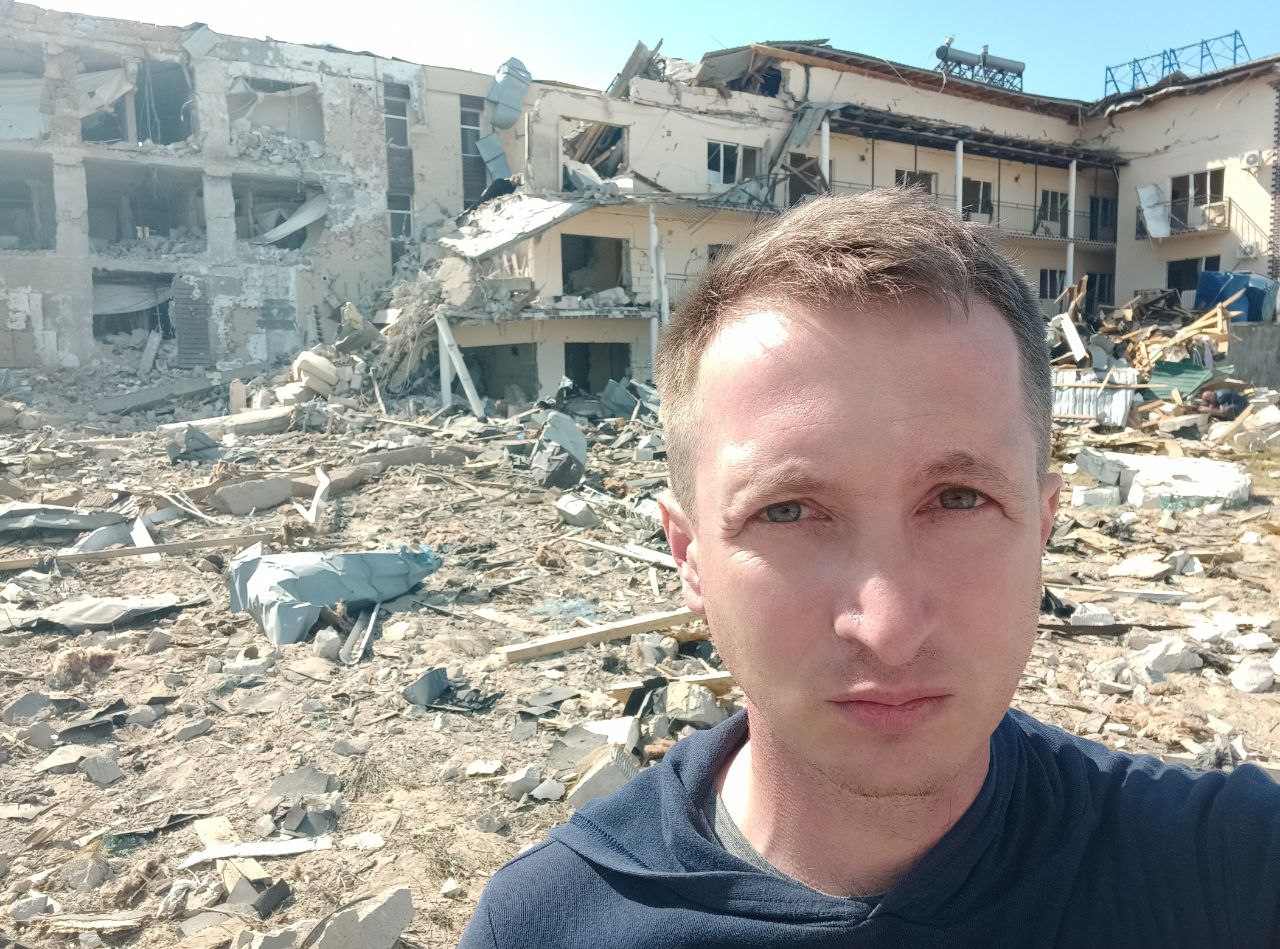
Artem Perfilov
The first such opportunity occurred in mid-March 2022 when an old acquaintance of his asked him to bring a group of Italian journalists to Odesa.
After that, groups from the Italian Radio Rai started to become Perfilov's regular clients. As a fixer, he also managed to work with TV presenters from Rai, the Finnish newspapers Helsingin Sanomat and Ilta-Sanomat, Spanish radio presenters and other journalists, one Danish publication, and the American media outlet The Hill.
Three main areas of work
Perfilov highlights three main areas of the fixer's work:
- Organization of filming or meetings.
Finding necessary contacts, setting up a meeting, determining where and under what conditions it will take place.
- Getting behind the wheel and working as a driver.
Often optional, but a significant advantage.
- Translation — simultaneous translation on site, and, if necessary, translating the collected material.
"In addition, we talk about booking hotels, laying out routes, planning work, but this is already worked out during work," adds Perfilov.
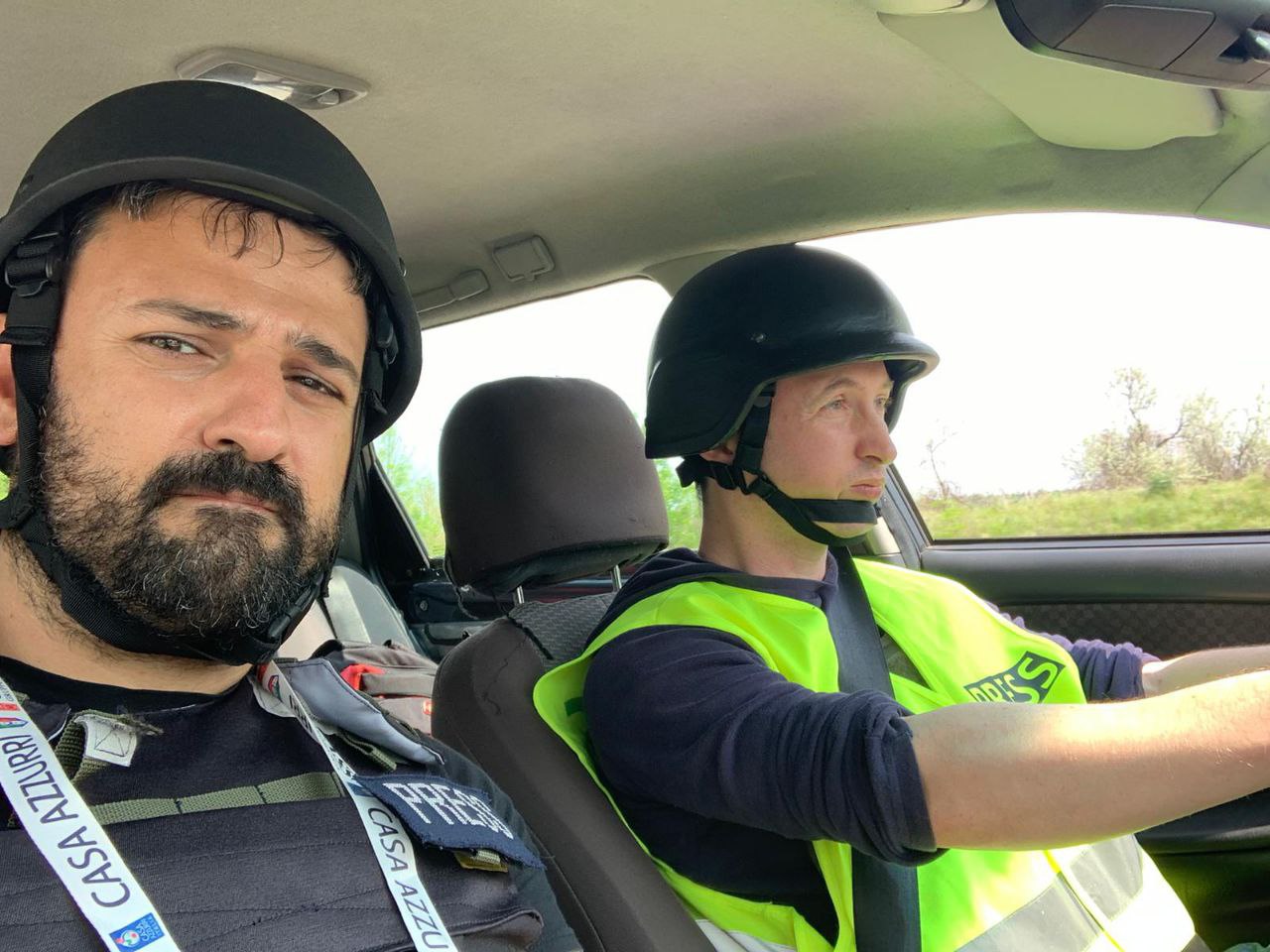
Artem Perfilov (right) while working as a fixer.
"Everything depends on trust"
Perfilov and the rest of the fixers with whom Rubryka spoke say that all cooperation agreements are mostly verbal, and cooperation is based on the honest word of both parties.
"I know of only one case when cooperation was documented," says the fixer. "In the beginning, foreign journalists were also cautious with local people. And when there is already trust, a verified person with whom they work, we can even exchange gifts. For example, they can bring me cheese, and I can hand them a bottle of wine. And that's great."
Sometimes journalists had to reject offers, Perfilov shares. But in the fixer environment, there are almost mythical stories about such characters.
"There was an Indonesian designer who pretended to be a journalist, and he even had the Armed Forces of Ukraine accreditation. He asked me to organize an interview with someone like the "Ghost" battalion, an illegal armed formation part of the 2nd Army Corps of the Russian Federation," the fixer shared with Rubryka.
Perfilov refused and then googled this alleged journalist and found out that he is a designer who collects such content for his Instagram, and he has already had similar scandals worldwide.
Journalists who learn Ukrainian are pleasantly surprised
Artem Perfilov works mostly with Italian media, and some of them have already started learning Ukrainian. The correspondent of the Finnish newspaper Helsingin Sanomat pleasantly surprised the fixer because, despite knowing Russian well, he had started learning Ukrainian.
"I saw him when he went to Kyiv, cut off his long braids, made an oseledets haircut, a traditional Ukrainian hairstyle associated with Ukrainian cossacks, and put on an embroidered jacket. It was amusing and joyful," Perfilov shares.
It is not often that Perfilov succeeds in combining fixership with journalism — it is more the exception than the rule. Instead, the experience of the fixer made it possible to rethink the image of Western journalism:
"First, I came down from heaven to earth. I see how foreign colleagues work and understand that they have the same problems as us. You can't say they are super cool, and we are not," Perfilov continues.
"Secondly, I'm glad you can speak with them in the same language, and it's not just English, which I was bad at initially. I still take online lessons. It's about journalists from different countries always understanding each other because they have many common feelings, opinions, and points of contact."
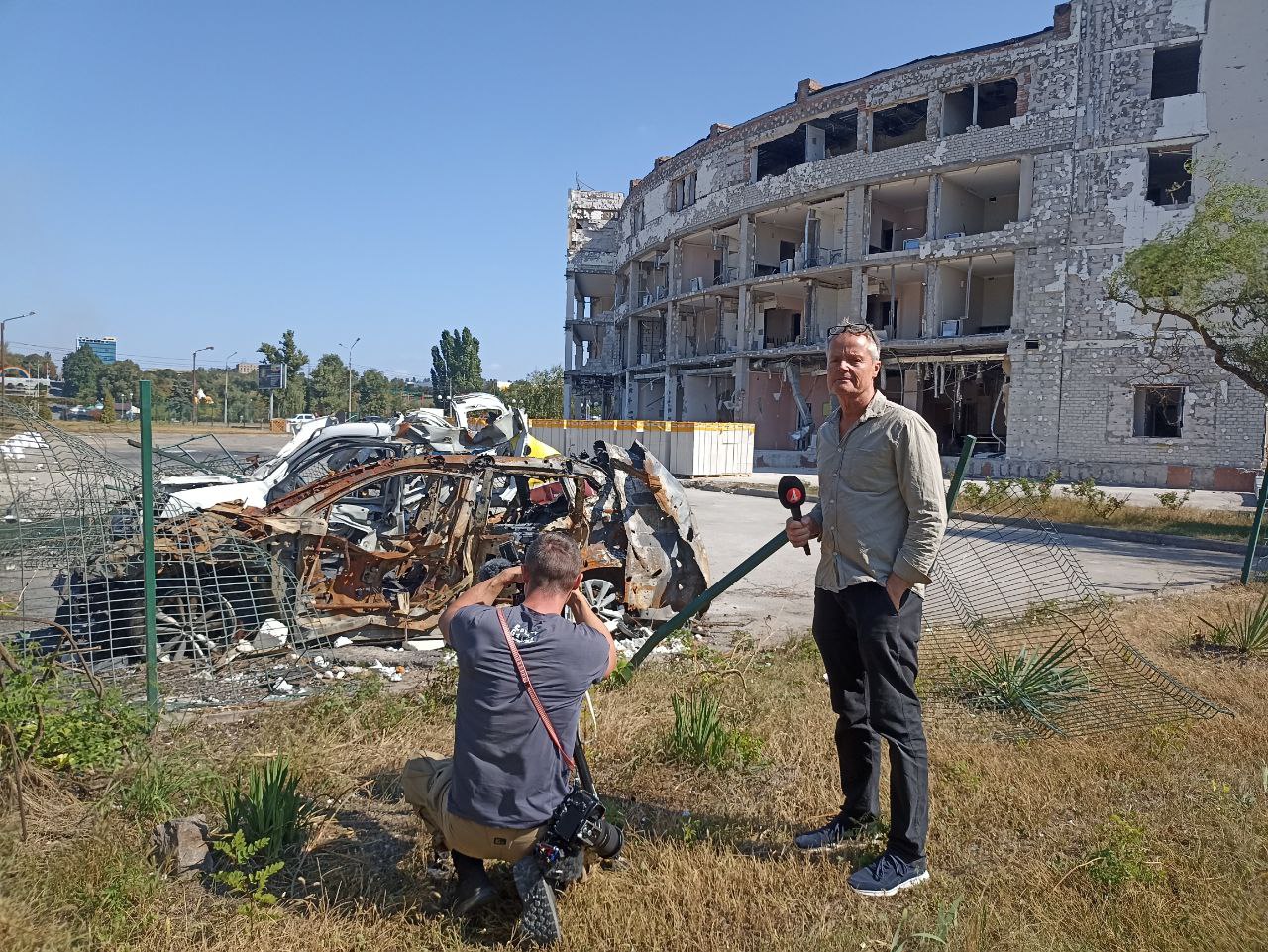
Swedish journalists work at the strike site in Zaporizhzhia.
According to Perfilov, some foreign colleagues are interested in the Ukrainian media market. Unlike in Ukraine, where printed newspapers are declining, printed media abroad still have their audience.
"You need to understand that this is a risky job"
"You really need to understand that this is a risky job," emphasizes Perfilov. You always have bulletproof vests, helmets, and first-aid kits with you, not only for yourself but sometimes even for those visiting journalists.
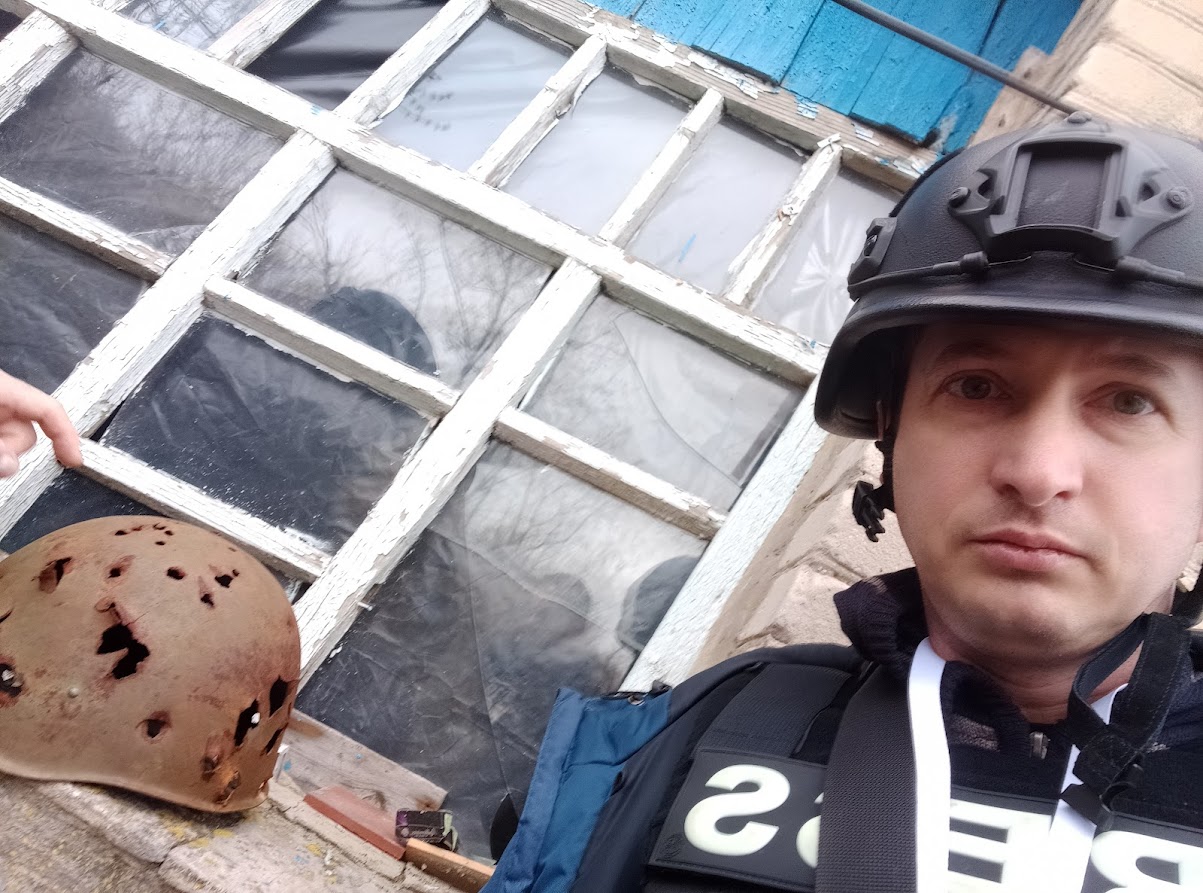
Artem Perfilov.
During his work, Perfilov experienced dangerous situations more than once. For example, even before the liberation of Kherson by the Ukrainian army, he and the journalists came under fire on the Mykolaiv-Kherson front. The same thing happened in Orikhove in Zaporizhzhia.
Perfilov says: "Last time, it was generally very trashy there because we had to sit in the drainage pipe of the waterworks: a drone was aiming at us with cluster ammunition. Then, in small groups of one or two people, we ran to the cars and raced out there."
According to the fixer, a separate difficult issue is cooperation with press officers: "Sometimes working with them is difficult because by default the military tries to close everything 'just in case.' I understand them, but as a journalist, I understand that we also need to do our job. We have to somehow communicate, find compromises between where we can work and where we can not."
Now, the names of good press officers are passed around "like gold," says Perfilov, and any fixer can name these names and say that these are people with whom they worked well.
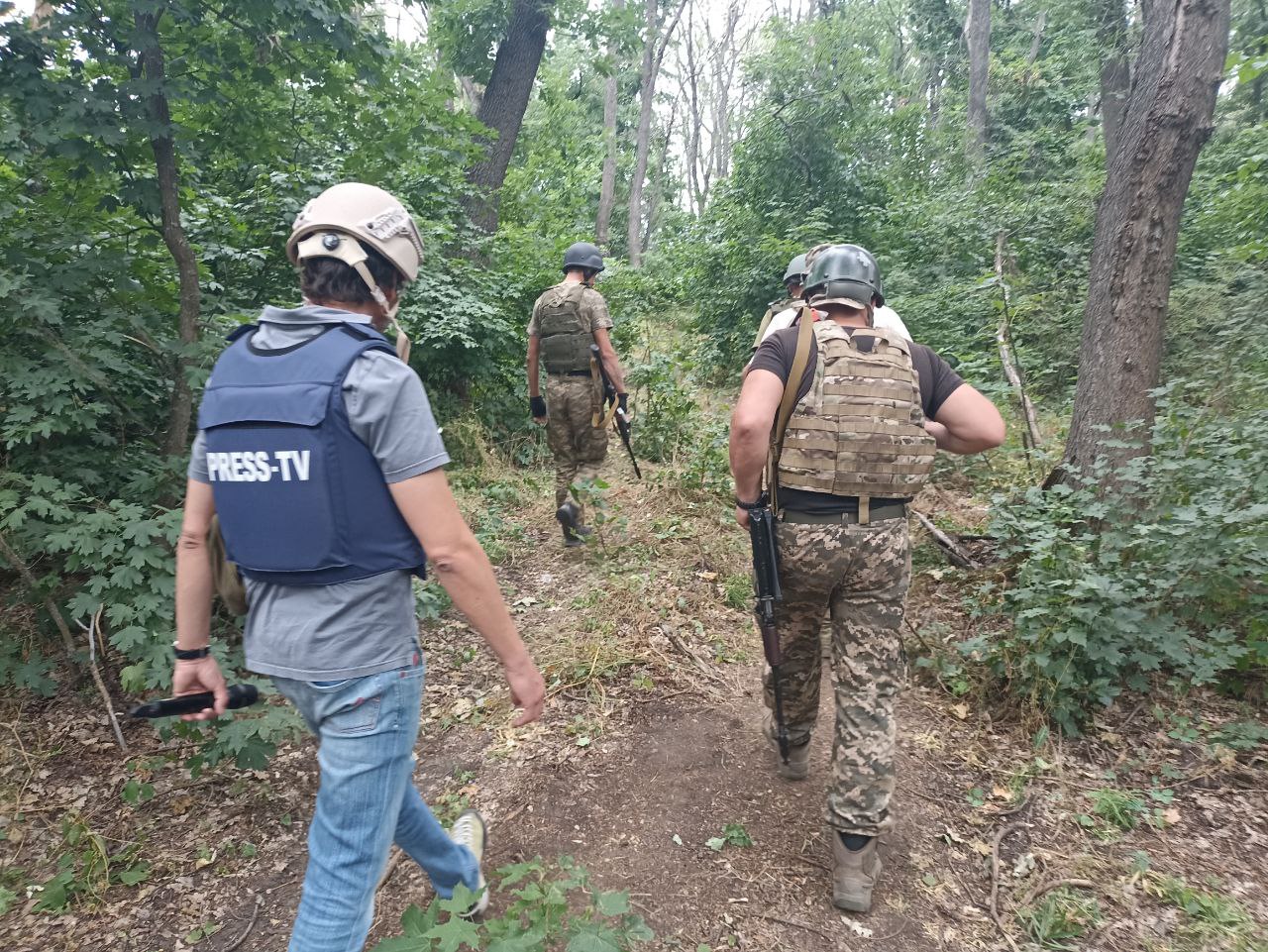
Realities of work of a fixer.
It is also necessary to understand, concludes Perfilov, that fixing is an unstable job and it can end at any moment. Therefore, he advises fixers to always think about the future and learn languages. The more languages the fixer knows, the better. Of course, it is more comfortable for foreigners to communicate with those who know their native language — for example, French or Spanish.
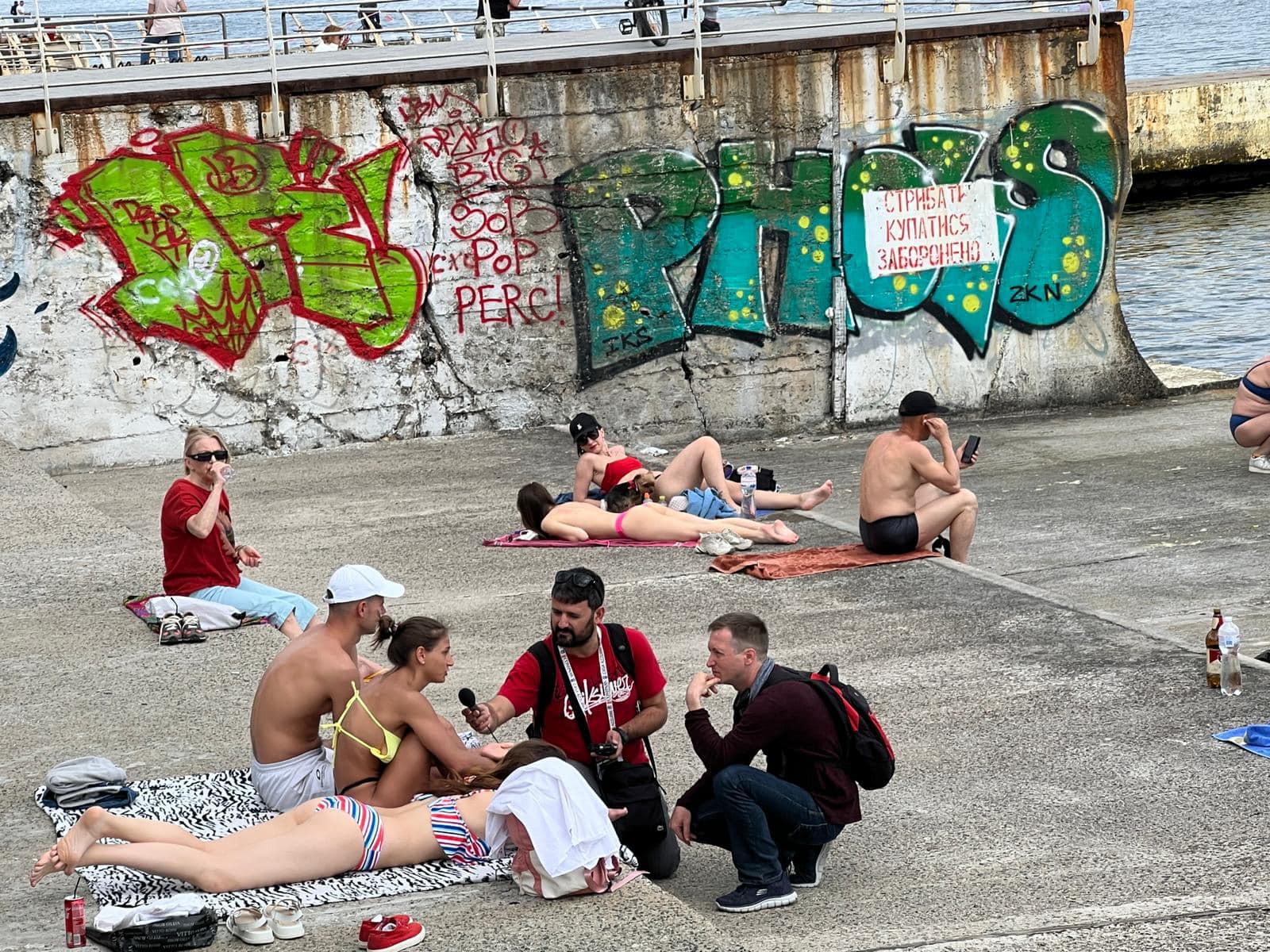
While working with foreign colleagues.
Tetyana Drobotya: "If you can do ten things at the same time, this job is for you"
Tetyana Drobotya is from Zaporizhzhia and is currently 33 years old. At the beginning of the full-scale invasion, she was 31. At that time, she specialized in luxury goods marketing and was the marketing director of various companies. She advised companies in Zaporizhzhia, Dnipro, and Canada in various fields. When the full-scale invasion began, like many people, she was left without a job because nobody needs luxury goods when there is a war.
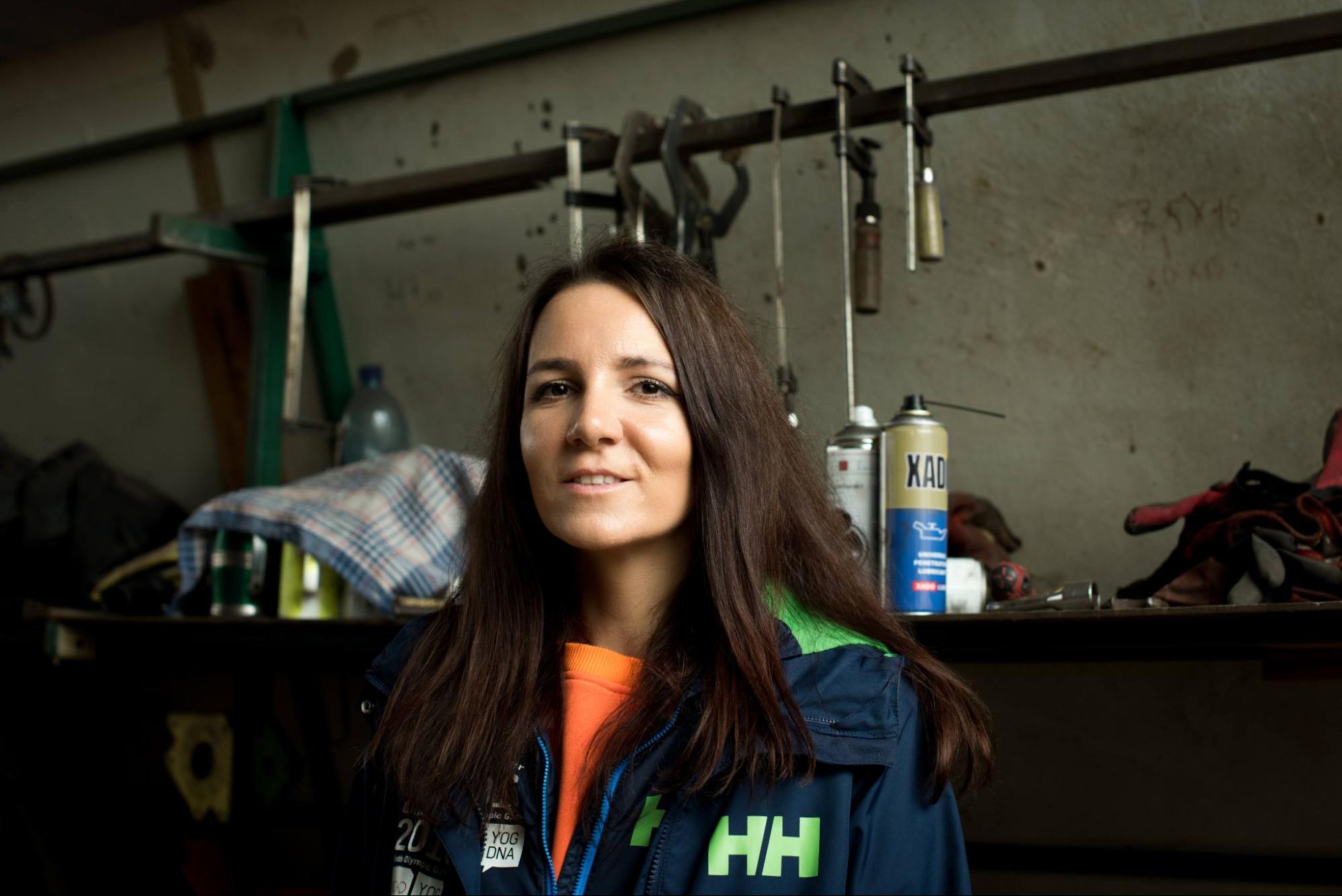
Tetyana Drobotya.
In addition, the fixer recalls that it was scary to fall asleep in the first weeks after invasion, because Russia was occupying new settlements, and the front line was moving closer and closer.
"Since I didn't have a job and it was terrifying, I joined the volunteer center Palianytsia, which later became the largest. I started helping them with the media," says Drobotya.
Her previous work experience as the press secretary of the head of the Zaporizhzhia Regional State Administration came in very handy for the future fixer, and that was just the beginning.
"I want to talk about my city because I love it with all my heart"
"I understood that there was simply a complete vacuum on the information front of the Zaporizhzhia region. My motivation was that I wanted to tell about Zaporizhzhia, to show that it is preparing to meet the enemy, not with bread and salt," Drobotya recalls. "Also, because I studied in London and consulted for companies in Canada and other countries, my English is excellent, and I was able to pick up work with foreign media as well. That's how we started our information work for the region."
Drobotya says her motivation remains the same because, unfortunately, there are often foreign journalists who think that all of Zaporizhzhia is occupied. For example, correspondents recently wanted to ask a Zaporizhzhia resident about the elections.
"I didn't even immediately understand what we were talking about, and then it turned out that the journalist believed that Zaporizhzhia was occupied," says the fixer. Due to this, certain difficulties arise even in the business sphere. Some banks do not allow international payments because the entire region is marked as occupied. Nobody wants to go into details, whether it's 40 kilometers from the city or less. "That is why I continue to work in this field. I want to talk about my city because I love it with all my heart," the fixer shared with Rubryka.
Drobotya also became the face of a mural painted in Vilnius on the House of Moscow.
"I usually offer ten stories to choose from, and the team leaves three to four"
The experience of working in marketing and the Zaporizhzhia regional administration with the press gives the opportunity to find exciting stories and interesting heroes, says Drobotya.
Her duties as a fixer also include travel planning, logistics, and hotels: "I usually offer ten stories to choose from, and the team leaves three to four. Then I get in touch, arrange an interview, accompany journalists, translate, and give all the necessary additional information," says the fixer, and then adds with a smile: "If you can do ten things at the same time, then this job will definitely suit you."
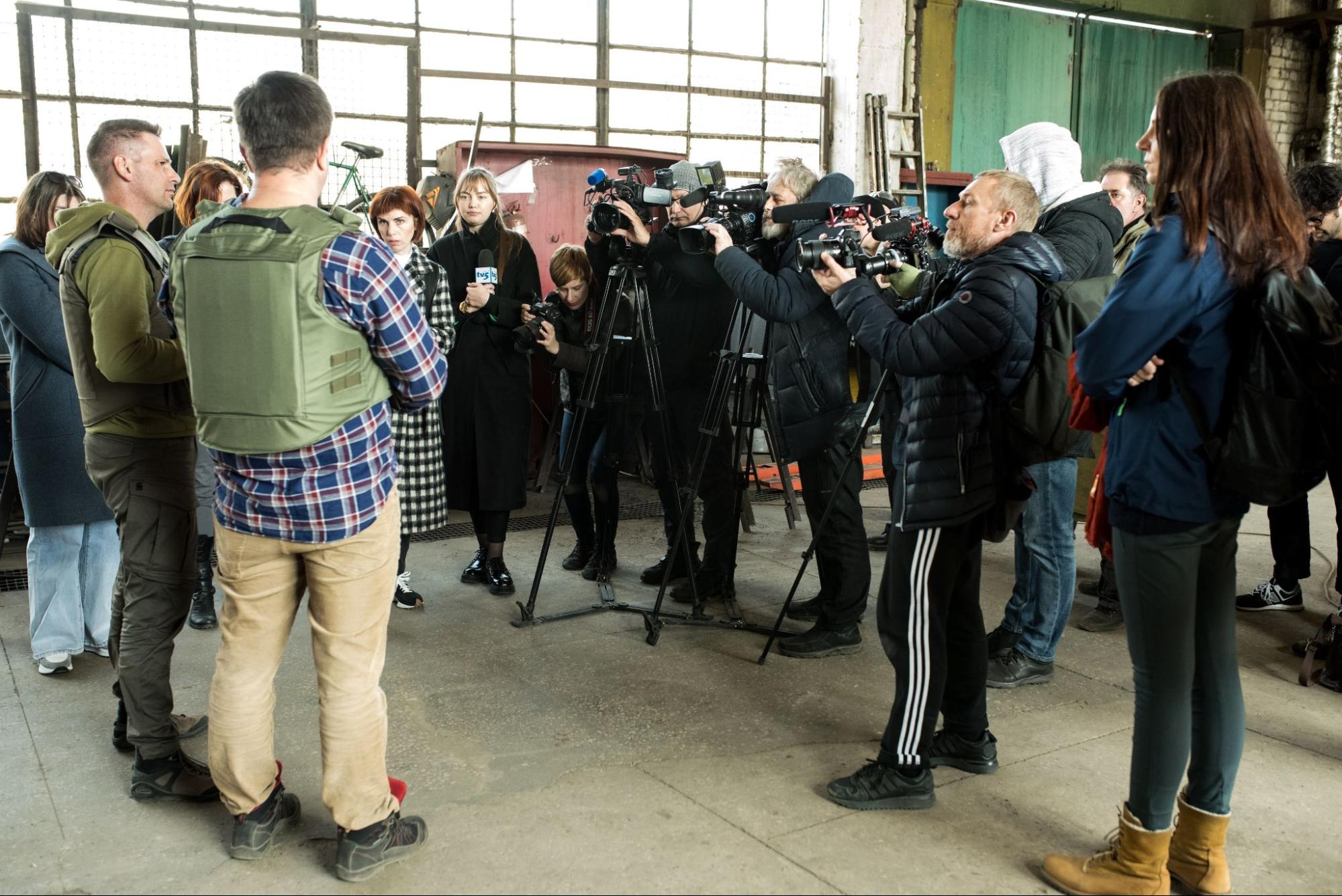
Tetyana Drobotya is standing far right.
As a fixer, Drobotya works in Zaporizhzhia and the surrounding areas. She does not go to the front line. Her best and most difficult experience is cooperation with TV channels that do not just shoot news stories but make longer video features.
"When you work for journalists who write, you must focus only on the conversation. When you work with TV channels, you need to focus on the conversation, what is in the frame, and the fact that you have two or three cameras. Each of them must have something to shoot to make a good two-minute story later," explains the expert.
Working with foreign colleagues teaches and motivates her: "You constantly see how other people work, and you can improve yourself."
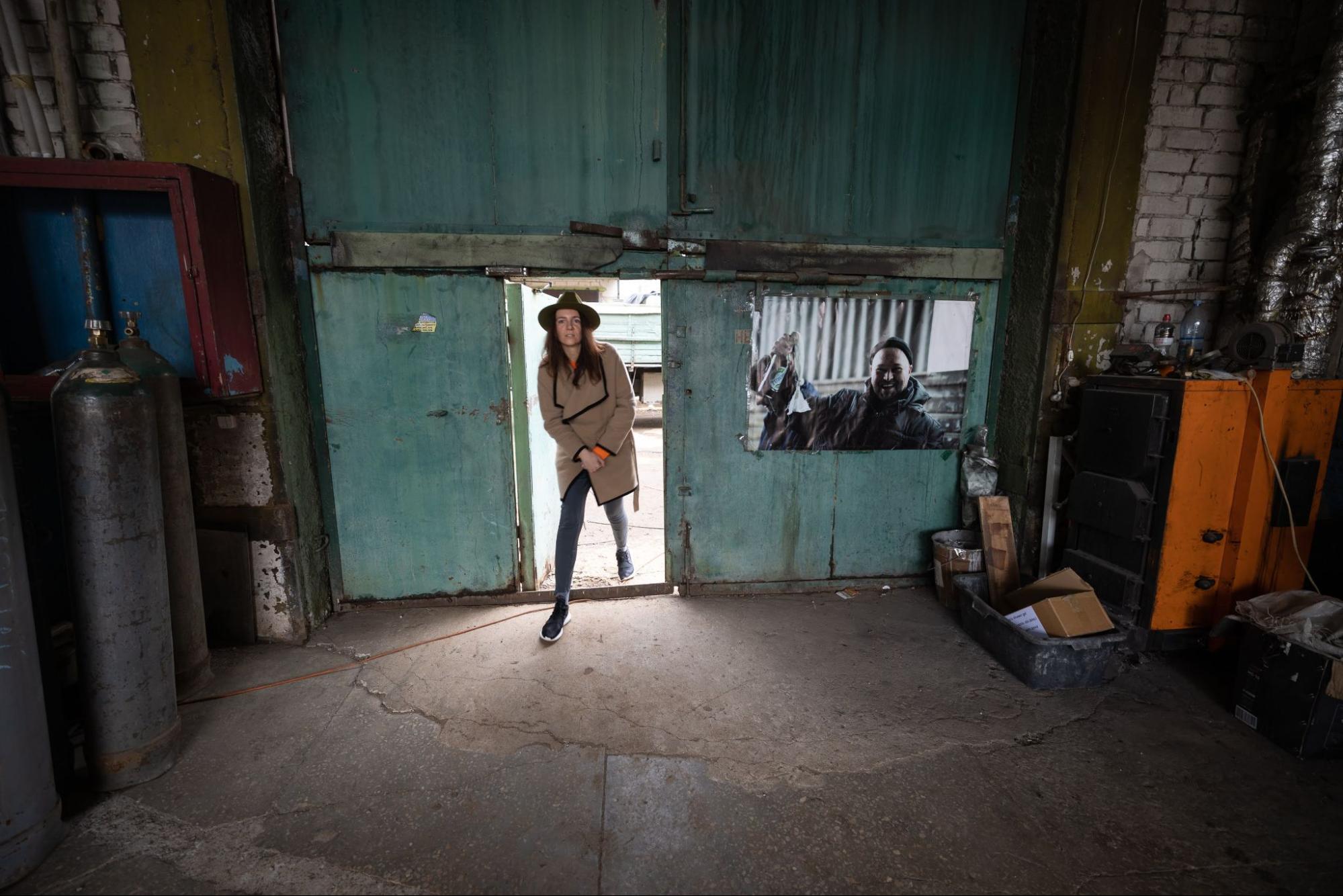
Tetyana Drobotya.
How can fixers improve their work?
Work on translation accuracy and always have a plan B
"If you work as a fixer, it is essential to constantly improve your language, your skills, and memorize words," advises Drobotya. Unfortunately, she often saw inaccurate translations in her colleagues' work. Because of such moments, inaccurate information sometimes spreads.
Sometimes, it is difficult, but there is a solution.
The fixer gives an example: "I worked with a psychologist who studied how war affects people. There were terms you didn't understand, even in Ukrainian, which must still be translated into English. To avoid such things, I usually ask the guest, if they are going to say something like this, to give me a short preview so I could prepare some vocabulary. Then my work with the journalist will be professional, and I will do a quick, high-quality translation."
Also, in fixing work, you must always be ready to change schedules: "You should always have a plan B. For example, I usually plan plus one hero if something doesn't work out. You have to be calm about it. This is life, this is work. If you're looking for stability, it's definitely not about the fixer job," assures Drobotya.
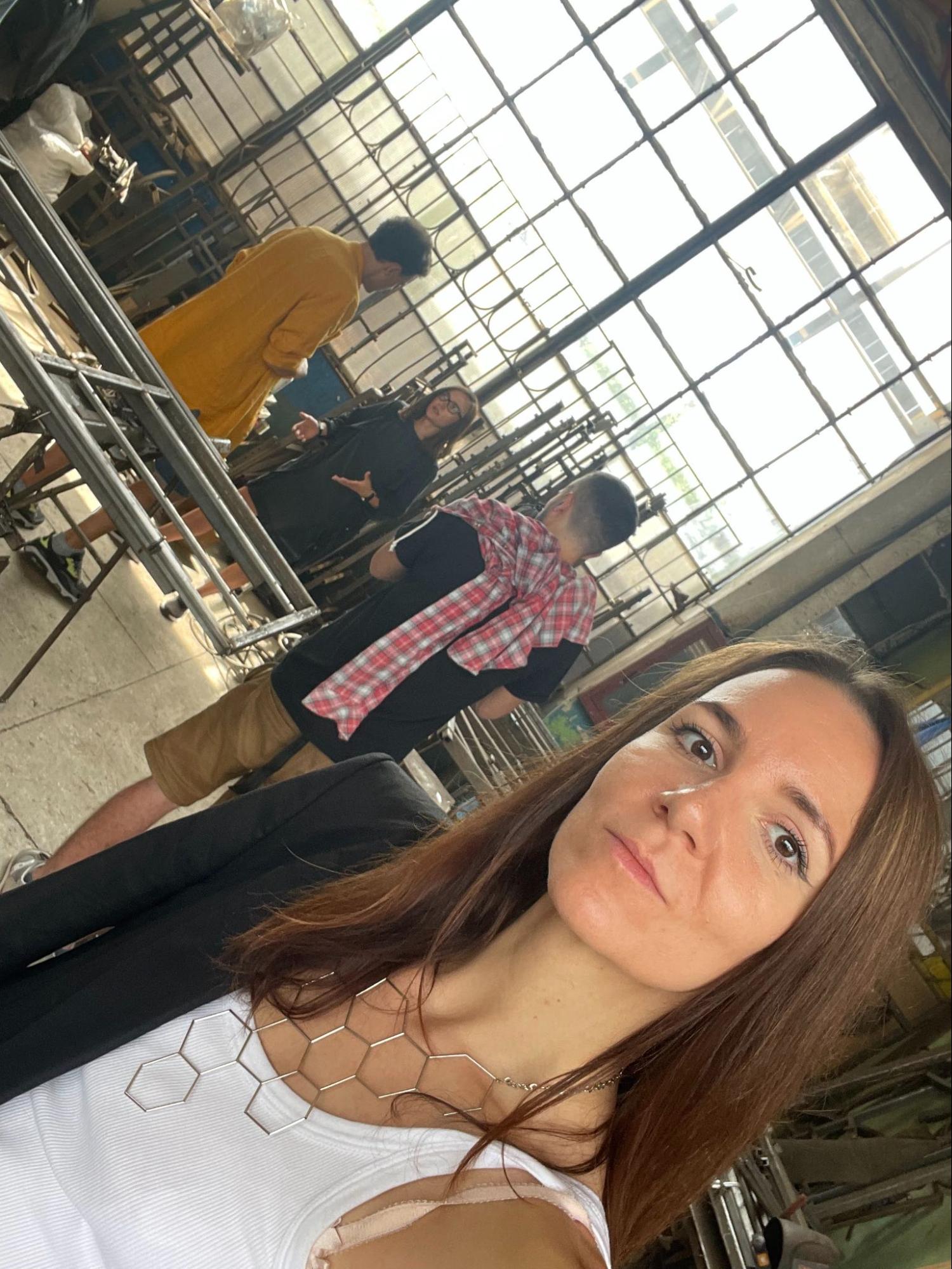
Tetyana Drobotya while working as a fixer.
The same applies to earnings. There is a lot of work when there is some activity in the area. Sometimes, there may be no work for two or three weeks, which is also normal, says the fixer.
"I mean, for me, it's a part-time job, but it's enjoyable. I really like this job," Drobotya admits.
As for the formal side of the matter, Drobotya does not conclude written contracts with clients. As an individual entrepreneur, she receives the profits from this work officially and pays taxes on them.
What impression do foreign colleagues make?
"Ah, you're not from an occupied city? I need someone from the occupied"
Drobotya has very good impressions of the people with whom she has developed constant cooperation. For example, this is an Icelandic team in which a special correspondent who writes texts and takes photos is from Iceland, but his wife is Ukrainian. They lived in Ukraine for several years and were here when the war started. For him, this is also his war.
"I thought, 'what can I do? I am a foreigner, I take good photos, I have an audience in Iceland, I have access to the media in Iceland, I will tell them about the war'," Drobotya recounts the words of her colleague.
He chose his path — to tell about the war in Ukraine through personal stories, such as an interview with the mother of a fallen hero or an interview with refugees.
"It helps to reach exactly that audience. Because simply combat actions, unfortunately, do not include them in any way. Iceland is a very distant island state. Ukraine's war zone for the people there is like an action movie about war," explains the fixer.
There is also a part of journalists — often very young, who, according to the fixer, come to Ukraine just to make a career. "For some, this is an opportunity to make a name for themselves, but in most cases, these are very professional and dedicated people," says Drobotya.
Those who ask questions like, "Oh, you're not from an occupied city? Tell me, do you know someone from the occupied? I need someone from the occupied one," disappoint Drobotya.
"It's like he's asking me to call my sister on the phone. Such people annoy me, and sometimes I even want to answer them sharply, but I take a deep breath and calmly explain how everything works. If I can slightly change the understanding of at least one person, that's very good," says Drobotya.
Unfortunately, people get used to war, and it is increasingly difficult to maintain the interest of foreign media in Ukrainian events.
"For me, this is a continuation of this work so that people know about Zaporizhzhia so that they know and do not forget about Ukraine. It takes a lot of effort from all of us so that Ukraine does not disappear from the information radars," the fixer is confident.
Oleksii Otkydach and Kristina Bohdiazh: "For the first time in our lives, we heard the word 'fixer' in April 2022"
The couple are historians by education, but they also studied languages and even worked as teachers before the war: Oleksii taught Spanish, and Kristina — French.

Kristina Bohdiazh and Oleksii Otkydach.
When the war began, the couple began to consider where their efforts could benefit most.
"We know languages — that means we can comment on everything that happens here, speak to foreigners, make posts, videos, and so on," the young people decided.
The couple spent the entire brutal end of February and March 2022 in Kyiv. "It was quite difficult psychologically, so we sat in the bathroom and kept in touch." They had various foreign friends and acquaintances — that's how we came across the first journalist. It reached the point that they had 30 or 40 daily comments or interviews aired on radio and television. Geographically, these were absolutely all the countries of Latin America, as well as Spain, France, Serbia, and many others. Then, the journalists started coming to Ukraine. Representatives of the Argentinian newspaper, with whom the couple communicated remotely, came physically to Kyiv. Journalists began to ask who Oleksii and Kristina knew and concluded: "You will be our fixers."
"For the first time in our lives, we heard the word 'fixer' in April 2022," Otkydach smiles. "Before that, we had no idea how the media worked, who fixers were, what it was."
Then, one of the largest Japanese newspapers, The Yomiuri Shimbun, found the newly minted fixers.
"In fact, for all this year and a half, we have worked mainly with either Latin Americans or Japanese. There were also projects with Swiss television and French journalists. Currently, Kristina cooperates with the Spanish public broadcaster RTVE," continues Otkydach.
In addition, the couple took part in Nataliia Humenyuk's project "Connecting Continents," which brought representatives of Latin American and various African countries to Ukraine.
How does the fixer work?
"Combining the work of a local producer and project manager"
"I would say that a fixer is a combination of a local producer in logistics, a regional specialist, as well as a project manager, something like that," says Otkydach about his work.
He explains that, on the one hand, it's logistics, tickets, and hotels. On the other hand, it's a local producer because some media directly say: "Listen, what do you offer us? Give us some stories." And you find them. You also make requests, get permits, find a press officer, send them materials for approval, and then ready-made materials. That is, you lead the project from beginning to end.
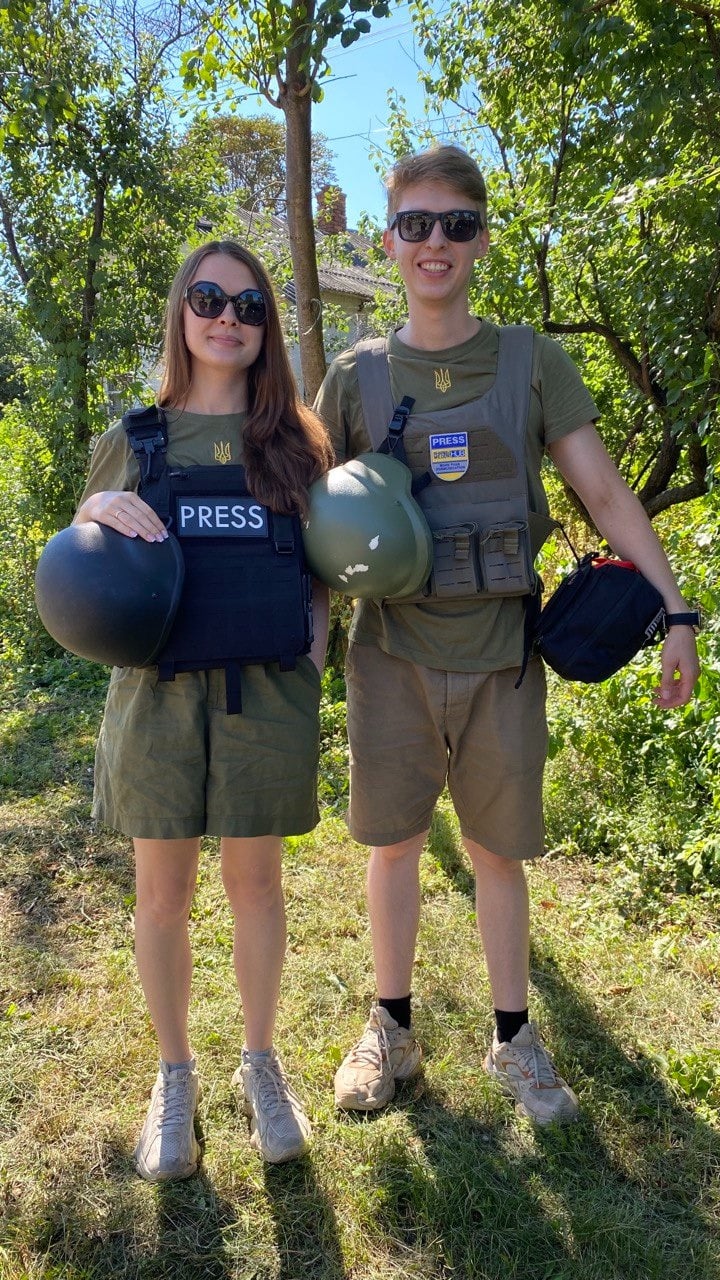
Kristina Bohdiazh and Oleksii Otkydach.
The most difficult thing about cooperating with foreign journalists is when they are poorly aware of the realities. For example, just after the liberation of the village Robotyne, in the Zaporizhzhia region, which is all mined and under fire, many journalists were already saying: "We need Robotyne," shares the fixer.
Journalists may often push fixers to work in risky areas – for example, recently, a group of volunteers died under fire near Bakhmut in Ukraine's Donetsk region. "The media representatives we are working with now say they want to go to that place. But it is three kilometers from Bakhmut, under fire, and the military is moving there on armored vehicles. Well, you simply can't go there!" Otkydach says, not hiding his emotions.
He is convinced that novice and experienced fixers should remember that no three-minute report is worth their life.
"And you really can't go where the press officers forbid you to go —Antonivskyi bridge in Kherson or Chasiv Yar — Bakhmut highway. You can't — means you can't," adds Otkydach.
The fixer's interaction with the military is usually precise and clear. He shares that he has never had a problem when he was not allowed to work.
What features should a fixer have?
"Discipline is 100%, organization is 100%, communication is 1000%," Otkydach lists.
The work of a fixer involves the need to talk to people constantly and talk about complex topics. These may be victims or witnesses of torture, people whose relatives have been kidnapped, or other survivors.
"You need to be able to communicate. You need to find the key to this person. And do it carefully so as not to hurt them," stresses Otkydach. "Discipline and organization are also important. Without it, you won't be able to do your job."
Also, the fixer advises not to forget to take care of your mental health because intensive work as a fixer is tough psychologically.
The media in this situation are like tourists: they arrived, worked for two weeks, and left, says Otkydach: "These are impressive stories, they chatted and left, and you stay with these stories. You pass them through yourself when you translate. Then, you sometimes see in the news that these heroes have died. In my experience, three people with whom we somehow interacted have died under different circumstances. That's why you need to rest, take care of your psychological well-being, and don't shy away from seeing a psychologist."
This work is not easy physically: you sleep little, move around a lot, and often sleep in hotels or apartments with deplorable conditions. You have to be ready for Spartan conditions, warns the fixer.
What impresses foreign journalists?
"Everyone here receives a pro-Ukrainian vaccination"
"My wife and I worked with probably a dozen media. Such a relative representativeness," says Otkydach. Often, journalists who go to work here are very poorly acquainted with the context of Eastern Europe, World Wars I and II, and the Soviet Union – and without some basic history lessons, reporting on Ukraine would be very, very difficult.
The couple says that all the journalists they have worked with become "inoculated" against Russian propaganda after one trip to Ukraine, even if it is only Kyiv.
"It is better to see once than to hear ten times," says Otkydach. "Once you hear a siren, it will scare you, once a rocket flies over you, or once you go to Irpin, see a burnt house — and that's it. Whatever Russians say about the 'Ukrainian nazis,' this vaccination is simply for life."
Some journalists impress the fixers with their professionalism and know the internal politics of Ukraine even better than Ukrainians. For example, Japanese journalists knew the names of all the staff of the president's office, oligarchs, parliamentarians, and the dates of the Ukrainian elections. A journalist from the Spanish El País was also very deeply into the subject.
How to protect yourself from dishonest customers?
Blacklists in fixer chats
"I don't know a single fixer who would somehow formalize their relations with the media," admits Otkydach.
But communities work: there are chats of fixers on social networks — regional and general. If a fixer or media misbehaves, they will immediately be blacklisted from these communities.
If this happens several times, the reputation will be ruined, and no one will want to work with such media or fixers in Ukraine.
Photos provided by the heroes of the material.

Stop, exhale, and inhale the Carpathian air: how and why retreats for Ukrainian journalists work

Knight tournaments and charity bike rides: ten creative fundraisers for the benefit of the Ukrainian army

"The path will teach everything:" Ukrainian travelers raise money for the army by hiking
Newsletter
Digest of the most interesting news: just about the main thing



